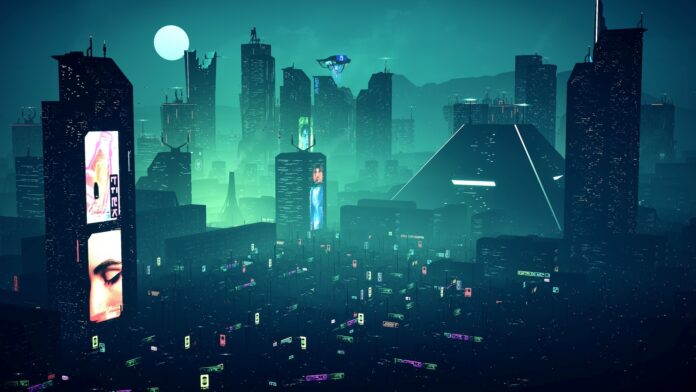Canadian solo dev Matt Marshall is the creator of the Cyberpunk-themed city builder Dystopika. It’s a no-goals, no-management sandbox that allows players to build dark cities that would make Deckard proud to hunt replicants in. Marshall created the game while drastically resetting his professional life. He quit his job and traveled through Japan, Indonesia, Thailand, and Vietnam. “Just me and my backpack,” he says. “I had maybe a year to make something that I could reasonably make solo in a year without funding.”
Moving away from the management role he held at his previous employer, Marshall rediscovered his love for creative, hands-on work. “Also, I was just getting older and wanted to feel a bit punk rock again,” he admits. His creative process involves drawing inspiration from everything he encountered during his travels. “I hate feeling like a tourist, but new landscapes keep me stimulated.” All he needs is “a notebook, a quiet place, and atmospheric music.” Marshall sought a way to reset his career and found it by going solo with his company, Voids Within. Now, he’s looking for ways to make this a sustainable business.
Why did you become a solo developer?
“Over the past few years I had been leading more teams in management capacity, being a bridge and ‘product owner’ for stakeholders and I just needed a break from that. It had been awhile since I had done anything completely born out of passion rather than business goals or stock price or whatever. In many ways it felt logical to get back to being hands on in creating but I also enjoyed that clarity of what I wanted to build without the usual design by committee processes that I had been through. And I think I was just getting older and wanted to feel a bit punk rock again.”
What are the biggest advantages of working solo?
“Just a clear flow of information between both hemispheres of the brain. Being able to visualize something and create it relatively fast.”
And the biggest pitfalls?
“Two hemispheres in the brain. My programmer brain will say that’s too hard and take too long when the designer brain know it’s right for the game. It’s this constant negotiation of what to work on based on motivation, energy, inspiration and will, where sometimes the things that are important are being lost. Like half assing two things instead of whole assing one thing.”

What’s your creative process?
“Notebook. A quiet place. Listening to atmospheric music. Grabbing visual inspirations from tumblr. Just trying to get a sense of place and then figuring out what kind of mechanics and interactions grow from it.”
How do you stay motivated through development?
“Realizing that it’s OK for motivation to dip was huge. I’d get frustrated on days where it felt like game development wasn’t happening. But once I understood for every day like that there were days that were these explosions of creative output, I became much more understanding of my motivation. What I needed was to step away. The next creative explosion will always come, but aim for no zero days. I always just push something forward a little bit – even if it’s just an email to your accountant or whatever.”

Will you ever work in a team or is it only solo for you?
“I want to collaborate again for sure. I love bringing in the right expertise for a piece of concept art or a soundtrack, but right now I’m very content focused on creating rather than running a company.”
How did you get the idea for Dystopika?
“It really came from burning down everything and going to a new part of the world. Just me and my backpack. I had maybe a year to make something and wanted to make something that I could reasonably make solo in a year without funding. Something that had a reasonable chance of commercial success. It wasn’t completely ‘whacky fun solo art time’, I wanted to reset my career and do something that would let me pay rent and buy food.”
“Small-scale, minimal city builders were doing well commercially and ticked those boxes. Cyberpunk stuff was my creative direction wheelhouse and I was coming off two cancelled projects in that genre, so I had a lot of built up creative energy to unleash some inner Blade Runner.”

What’s the biggest lesson you learned from this project?
“Nothing is ever simple or minimal. All games are hard and anything that ships is a miracle.”
The toll on your mental health can be quite high for solo developers. How do you deal with that?
“I’m extremely lucky and grateful that I was able to come to Asia and just find a new way of living that was better for me mentally. I still work a lot and I hate feeling like a tourist, but new landscapes keep me stimulated. I spent most of the past year flat broke, but just being in a different place helped a lot. Also helpful was just finding one collaborator and sounding board. Just someone you can give updates to and celebrate small victories with.”

